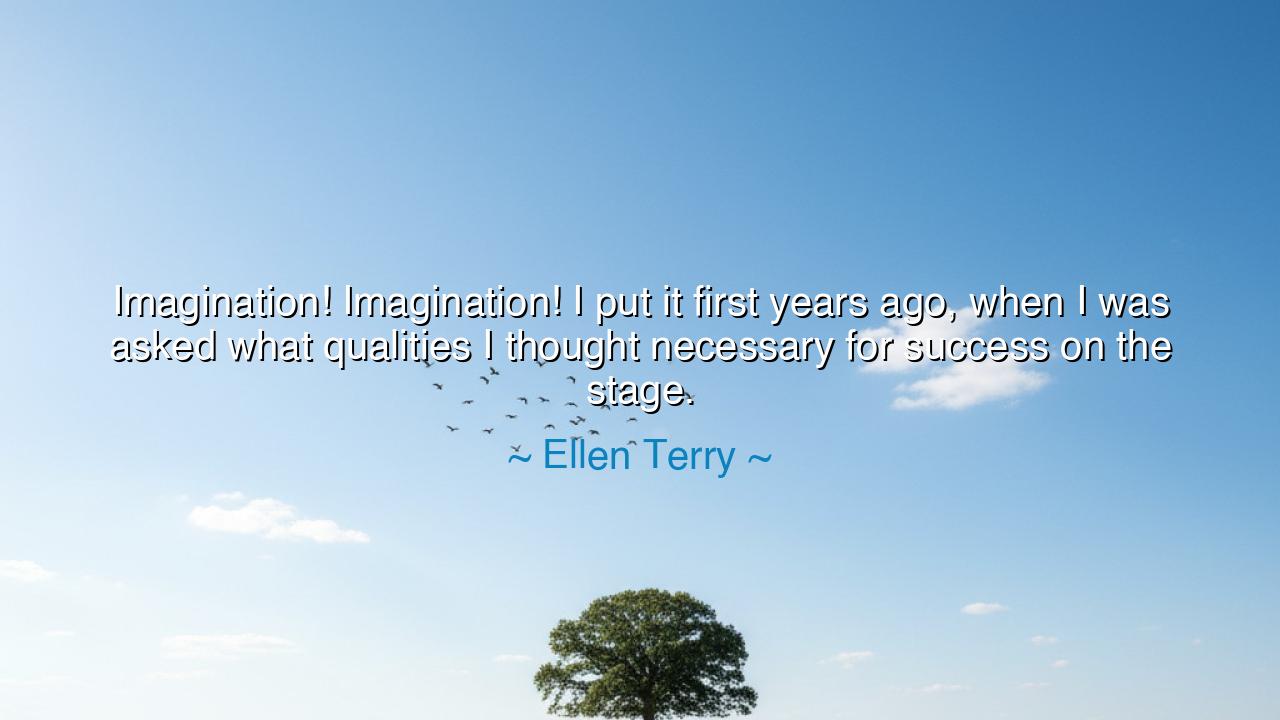
Imagination! Imagination! I put it first years ago, when I was
Imagination! Imagination! I put it first years ago, when I was asked what qualities I thought necessary for success on the stage.






"Imagination! Imagination! I put it first years ago, when I was asked what qualities I thought necessary for success on the stage." These words from Ellen Terry speak to the heart of what it means to be an artist, and more specifically, an actor. In this powerful declaration, Terry underscores the primacy of imagination as the essential ingredient for success, not just in the theater, but in any creative endeavor. For Terry, imagination was not merely a quality to be cultivated, but the very foundation of her art. It was through the power of her imagination that she could embody the characters she portrayed, stepping beyond her own life to take on the experiences, thoughts, and emotions of another. Imagination was the key to unlocking the soul of the character and presenting it to the world.
In the ancient world, the value of imagination was celebrated as a divine gift. The Greeks, especially in their theater, revered the ability of the actor to transform into another being, to become not merely a speaker of lines but a vessel of the character’s essence. The Greek theater was a place where the imagination of the actor and the audience would meet, where gods and mortals, heroes and villains, could be brought to life on the stage. In the words of Aristotle, tragedy was not just an art form; it was a way to experience profound emotions through the imagination, allowing the audience to explore human nature in ways that transcended the everyday. Terry echoed this ancient belief, for it was through imagination that an actor could move beyond their own identity and reach into the very heart of universal experience.
Consider the great actor Thespis, often credited as the first actor in Greek drama. Thespis was said to have stepped forward from the chorus, introducing the concept of individual performance, where the actor would engage with the audience not merely through words but through imagination. It was through his imagination that he could give life to the characters of Greek mythology, transforming himself into someone other than who he was. This transformation, brought about by the power of the imagination, laid the groundwork for all theatrical performances that followed, allowing actors to step outside themselves and live the lives of others. Like Terry, Thespis understood that the true essence of acting lies not in mimicry or reproduction but in the ability to create something new through the power of imagination.
In Shakespeare’s time, actors were tasked with bringing to life some of the greatest characters ever written—characters who were complex, multifaceted, and sometimes deeply conflicted. Richard Burbage, the leading actor at the Globe Theatre, famously portrayed many of Shakespeare’s most iconic characters, including Hamlet and Richard III. It was his imagination that allowed him to embody these characters, to breathe life into Shakespeare’s words and convey to the audience the full depth of human emotion. In his hands, Shakespeare’s characters were not just fictional creations; they became living, breathing individuals. Like Terry, Burbage used his imagination to transcend the ordinary and step into the extraordinary world of the play, where he could experience the triumphs and tragedies of his characters.
Terry’s emphasis on imagination reflects the belief held by many great artists that creativity is not confined to mere technique or skill, but that it is the ability to envision the world differently, to see beyond what is physically present, and to bring that vision into reality. The act of creating, whether on stage, canvas, or in life, is a sacred act that begins in the mind. Without imagination, there is no art, no progress, no new ideas. The imagination is the forge where all creativity begins. Terry knew that true artistry required a mind unbound by the constraints of reality, a mind capable of bending the world to its will. This is why imagination was, and remains, the most important tool in the artist’s arsenal.
The lesson here is one of empowerment and potential. Whether in the arts or in life, imagination is the first step in any creative journey. It is the spark that ignites innovation, the force that fuels change, and the foundation upon which all success is built. As Terry recognized, the power to transform oneself and the world around us begins with the imagination—through it, we can challenge the status quo, explore new ideas, and bring forth beauty and truth into the world. Imagination is not a frivolous luxury; it is the key to unlocking the most profound and meaningful aspects of human existence.
In practical terms, we must cultivate our own imagination. To live a life of creativity and innovation, we must constantly stretch our minds beyond the limits of what we know. Just as an actor uses their imagination to step into a character’s shoes, we too must use our imagination to step into the unknown. This means reading widely, exploring new experiences, and giving ourselves the freedom to dream. Whether it’s in writing, art, science, or leadership, we must embrace the power of imagination to guide us toward new possibilities. In doing so, we continue the ancient tradition of using our minds to create worlds that go beyond the boundaries of the present.
So, let us take Ellen Terry’s words to heart. Let us put imagination first in all our endeavors, knowing that it is the force that drives all creativity and innovation. In our work, in our relationships, and in our personal growth, we must allow imagination to guide us toward greatness. For it is through our ability to dream and to imagine what could be that we can truly shape a future filled with beauty, truth, and possibility.






AAdministratorAdministrator
Welcome, honored guests. Please leave a comment, we will respond soon